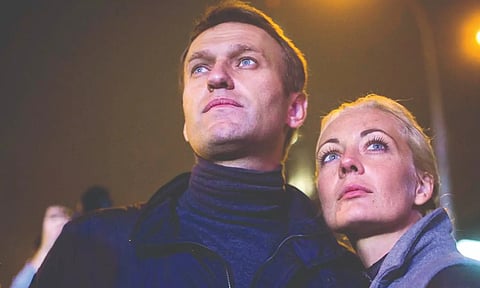

By Darko Janjevic
MOSCOW: With the death of Alexei Navalny, Russia has lost Vladimir Putin’s best known rival — but also unexpectedly gained a new symbol of resistance. In an emotional video posted in the days after his death on February 16, Navalny’s widow Yulia Navalnaya pledged to continue her husband’s fight against the regime and urged others to fight “harder, more desperately and more fiercely,” than before. “I know it already appears impossible to do more, but more is needed. To join up into a single powerful fist and strike their insane regime — Putin, his friends, the bandits in uniforms, thieves and murderers who have crippled our country,” she said in a video on Navalny’s YouTube channel.
Navalnaya said her husband was “unbreakable.” “And that’s exactly why [Vladimir] Putin killed him — shamefully, cowardly, without ever looking him in the eye,” she said. The Kremlin has denied any involvement into Navalny’s death. But Navalnaya believes he was assassinated due to his work as anti-corruption crusader and government critic. This is also the stance that has been expressed by most Western leaders.
Navalnaya’s comments could easily put her in the crosshairs of the same people she has accused of murdering her husband. And Navalny’s death isn’t an isolated case — nearly all notable Kremlin critics are now dead, jailed or have been forced into exile. For Mikhail Khodorkovsky, one-time oil billionaire and Putin opponent, Navalnaya’s promise to fight the regime is a “brave and risky” move. “I respect her for taking this step and find it good that Navalny’s supporters have someone who can pick up the flag and is acceptable as heir to Alexei’s work,” Khodorkovsky told DW Russian.
Khodorkovsky was jailed in 2003 and spent over a decade in prison while the state nationalised his Yukos oil company. He left for the UK immediately after his release in December 2013. Though stripped of most of his wealth, the former oligarch has continued to provide financial support to the opposition in Russia from abroad.
Speaking with DW, Khodorkovsky said he hoped for more coordination and mutual support between different the factions of Russia’s opposition. He also said he had listened to Navalnaya’s recent address to the European Parliament, which was closed to reporters. “In principle, I am ready to act together [with Navalnaya] on all positions,” Khodorkovsky said.
In her future political career, Navalnaya could draw from the experience of Belarusian politician Sviatlana Tsikhanouskaya, who decided to take the place of her jailed husband and run against dictator Alexander Lukashenko in 2020.
Tsikhanouskaya has managed to amass a huge following in Belarus, and is still active as the country’s best known opposition figure. Unfortunately, her story can also serve as a cautionary tale —Lukashenko managed to stay in office despite widespread claims of vote-rigging during the 2020 presidential election.
Tsikhanouskaya eventually fled to Lithuania. Once there, she published a video where she said that her decision to leave the country was made “absolutely independently.” But her comments also fuelled speculation that her family had been threatened by the regime.
“What is happening now is not worth anyone’s life. Children are the most important thing we have in our life,” Tsikhanouskaya said in the video. Russian art collector and gallery owner Marat Gelman, currently based in Berlin, told the AFP news agency that Yulia Navalnaya’s gender could be an advantage.
“Putin’s machismo works well with men, but it does not work with women. The face of anti-war Russia must be that of a woman,” he said.
But Zhanna Nemtsova, the daughter of Russian opposition leader Boris Nemtsov who was killed near the Kremlin in 2015, told DW that a female leader is “no panacea.” “It’s important to understand that being a woman doesn’t mean being a good, orderly, democratic-minded person,” she said. She pointed out that most judges in Russia are women and they are passing “beastly verdicts” against opposition leaders.
Nemtsova also said things in Russia are “boiling over” and opponents of the Putin regime are so starved for new leaders that “the discourse about male and female roles is fading into the background.” Nemtsova told DW that Navalnaya’s decision to continue her husband’s work was “absolutely correct.”